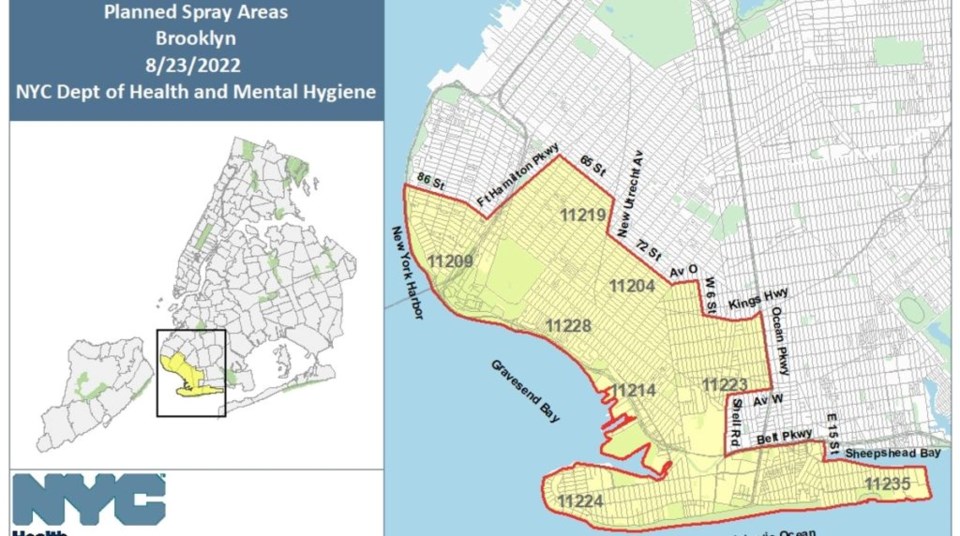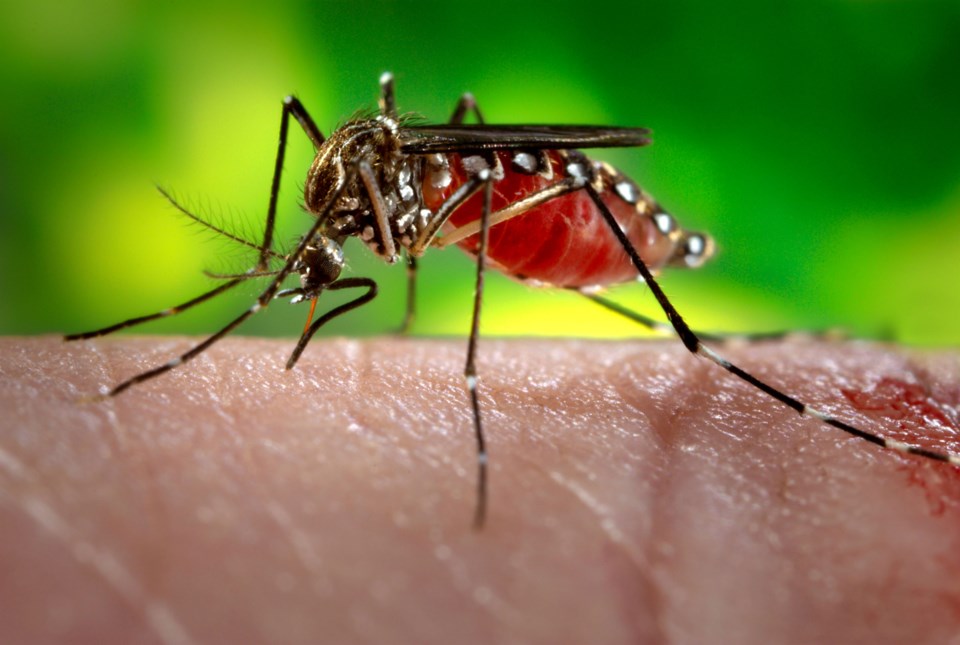To reduce mosquito activity and the risk of West Nile virus, the Health Department intends to spray adulticide treatments in Brooklyn and Staten Island.
The Health Department will use very low concentrations of Anvil® 10+10, Duet® or MERUS® 3.

Trucks will spray pesticides in sections of Brooklyn beginning on Tuesday, Aug. 23, between the hours of 8:30 P.M. and 6:00 A.M. the following morning.
In case of bad weather, application will be delayed until Wednesday, Aug. 24.
Locations of pesticide spray in Brooklyn for Aug. 23:
| Neighbourhoods | Boundaries | Zip Codes |
| Parts of Bath Beach, Bay Ridge, Brighton Beach, Bensonhurst, Coney Island, Dyker Heights, Fort Hamilton, Gravesend, Manhattan Beach, and Sheepshead Bay. | Bordered by 86 Street, Fort Hamilton Parkway, 65 Street, New Utrecht Avenue, 72 Street, Avenue O, West 6 Street, Kings Highway to the North; Ocean Parkway, Avenue W, Shell Road, Belt Parkway, East 15 Street, Sheepshead Bay to the East; Atlantic Ocean and Gravesend Bay to the South; and New York Harbor to the West. | Parts of 11204, 11209, 11214, 11219, 11223, 11224, 11228, 11229, and 11235 |
Trucks will also spray pesticides in sections of Staten Island beginning on Thursday, Aug. 25, between the hours of 8:30 P.M. and 6:00 A.M. the following morning.
In case of bad weather, application will be delayed until Monday, Aug. 29, 2022.
Locations of truck spray areas in Staten Island for Aug. 25:
| Neighbourhoods | Boundaries | Zip Codes |
| Parts of Arlington, Bloomfield, Bulls Head, Chelsea, Elm Park, Graniteville, Hartland Village, Manor Heights, Mariners Harbor, Mid Island, New Springville, Old Place, and Travis. | Bordered by Newark Bay, Port Richmond Avenue, Walker Street, Dr. Martin Luther King Jr Expressway, and Staten Island Expressway to the North; Richmond Parkway to the East; La Tourette Park & Golf Course Boundary and Richmond Creek to the South; and New Jersey-New York Boundary to the West. | Parts of 10303 and 10314 |
The risks of pesticides applied by the Health Department for mosquito control are low to people and pets.
Some people who are sensitive to spray ingredients may experience short-term eye or throat irritation, or a rash. People with respiratory conditions may also be affected.
To stay safe during mosquito spraying:
- Stay indoors, whenever possible.
- Air conditioners can remain on.
- While unnecessary, you may wish to close air conditioner vents, or choose the recirculate function.
The risks of pesticides applied by the Health Department for mosquito control are low to people and pets.
Some people who are sensitive to spray ingredients may experience short-term eye or throat irritation, or a rash. People with respiratory conditions may also be affected.
After spraying:
- Wash skin and clothing exposed to pesticides with soap and water.
- Always wash fruits and vegetables with water.
The most effective way to control mosquitoes is to eliminate any standing water. New Yorkers are also encouraged to mosquito-proof their homes and take precautions when spending time outdoors.
Reducing exposure to mosquitoes:
- Use an approved insect repellent containing DEET, picaridin, oil of lemon eucalyptus (not for children under 3), or products that contain the active ingredient IR3535.
- Make sure windows have screens. Repair or replace screens that have tears or holes.
- Eliminate any standing water from your property and dispose of containers that can collect water. Standing water is a violation of the New York City Health Code.
- Make sure roof gutters are clean and draining properly.
- Clean and chlorinate swimming pools, outdoor saunas and hot tubs. Keep them empty or covered if not in use. Drain water that collects in pool covers.
Report standing water by calling 311 or visiting nyc.gov/health/wnv. For more information about West Nile virus, call 311 or visit nyc.gov.




